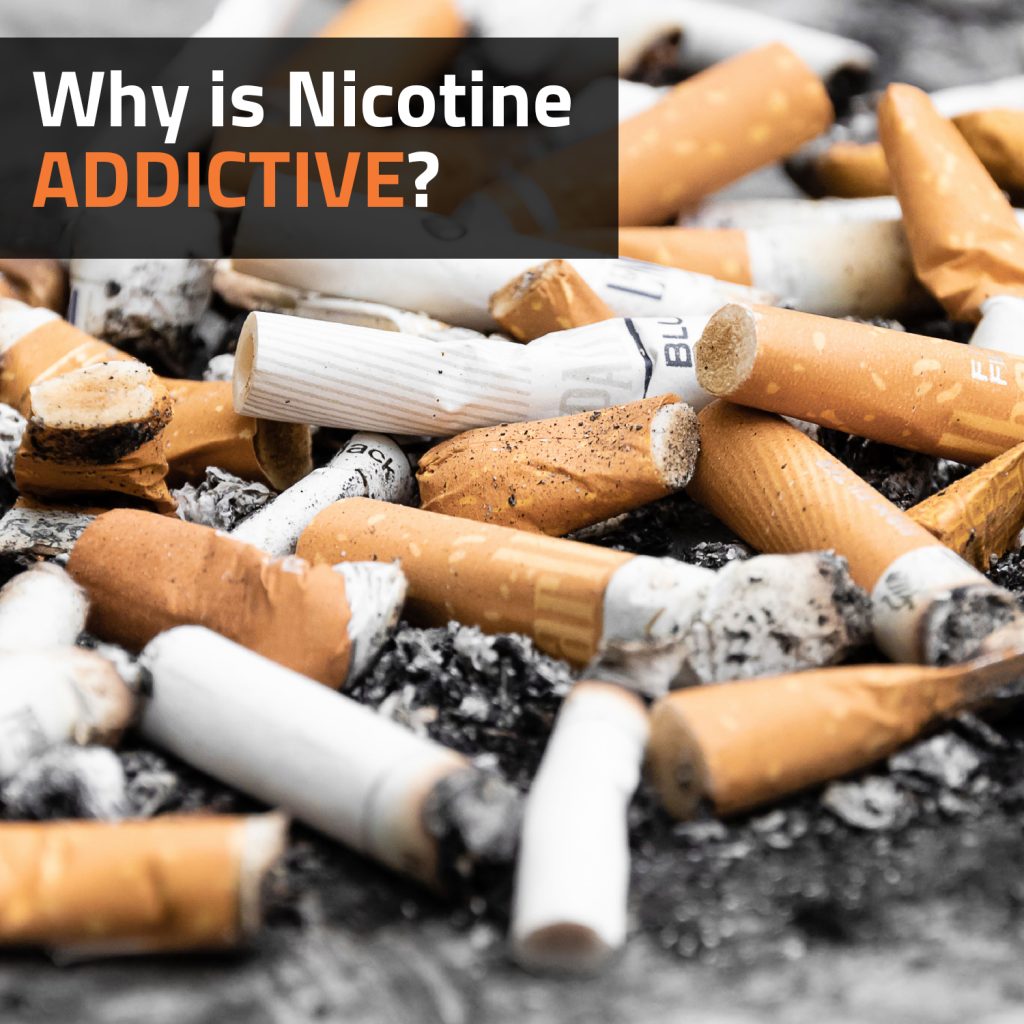Nicotine is the addictive chemical found in tobacco products. Using products that contain nicotine often leads to nicotine dependency due to the feel good sensation it provides. This is especially concerning when smoking traditional cigarettes, as they contain thousands of other chemicals, at least seventy of which are harmful to your health. Therefore, consuming nicotine through vaping is a much safer option.
What Makes Nicotine So Addictive?
Once nicotine is absorbed into your bloodstream, it starts to make its way to the brain. Within seconds of consuming nicotine, it will start to stimulate various neurotransmitters that are responsible for regulating mood and behaviour. Nicotine especially targets the release of dopamine, giving off that well-known “feel good” sensation.
With time, your brain starts to crave the dopamine rush obtained from nicotine, leading you to consume nicotine once again. As your brain becomes used to a certain level of nicotine, the craving for consuming higher levels of nicotine increases.
As nicotine reacts with your adrenal glands, it triggers the release of adrenaline, which tends to cause a burst of energy and/or focus depending on the individual. Your brain will also crave even more nicotine to try and keep up with the adrenaline rush.
In essence, the more nicotine you consume, the more you need to feel good. Whenever you try to stop, your body will crave nicotine, leaving you with unpleasant mental and physical symptoms. These symptoms are also referred to as nicotine withdrawal.
What Are The Symptoms Of Nicotine Addiction?
Some people are more susceptible to developing a nicotine addiction than others. This essentially means that consuming any amount of nicotine can be the start of a nicotine addiction. Signs of nicotine addiction include:
- A constant craving for nicotine – If you cannot stop smoking even though you have tried to, it is a telltale sign that you are addicted to nicotine
- You experience withdrawal symptoms whenever you try to stop – If you have experienced changes in your physical and mental state when trying to quit smoking along with a craving for nicotine, you have a nicotine addiction
- You keep smoking despite physical signs of deteriorating health – Being addicted to nicotine means that you will likely keep using products to satisfy your cravings despite experiencing problems with your heart and or lungs
Risk Factors That Impact The Formation Of A Nicotine Addiction
Anyone who uses any form of tobacco products is at risk for developing nicotine dependency. Some common factors that influence your risk of nicotine dependency include:
- Age – Many tobacco users started smoking at a young age, typically during their teen years. The younger you are when you start smoking, the higher the chance of becoming addicted
- Genetics – The likelihood of developing a nicotine addiction is partially inherited. This is because genetic factors usually influence how different receptors on nerve cells in the brain respond to high doses of nicotine
- Parents, peers, and social life – Children whose parents or peers smoke, or who are constantly in settings where smoking takes place, are more likely to try smoking and stick to it because of its social ties
- Depression and other mental health issues – Countless studies conducted on those with nicotine dependency show that there is an association between smoking and depression. Those who have been diagnosed with depression, post-traumatic stress disorder (PTSD), or schizophrenia are much more likely to pick up smoking
- Substance abuse – Those who already abuse substances such as alcohol or drugs are more likely to become smokers as well
What Are The Dangers Of Developing A Nicotine Addiction?
Tobacco smoke is known to contain over 70 carcinogens, along with thousands of other chemical compounds. This also rings true for herbal cigarettes or cigarettes advertised as “all natural”. Here are some of the dangers that go hand in hand with a tobacco dependency:
- Lung disease and/or lung cancer – Smoking is the leading cause of lung cancer and respiratory related fatalities. Smoking also causes a variety of lung diseases, such as chronic bronchitis and emphysema. If you already have issues with your lungs, such as asthma, smoking is bound to worsen your symptom
- A variety of other cancers – Smoking is known to increase the likelihood of developing cancer of the mouth, oesophagus, throat (pharynx), pancreas, bladder, larynx, cervix, kidneys, and some types of leukaemia. Smoking is the cause of over 30% of reported cancer fatalities
- Circulatory system and heart related issues – Smoking increases the risk of developing cardiovascular disease, such as heart attacks and strokes. If you already have a blood or heart vessel disease like coronary heart disease or hypertension, smoking will only worsen your condition
- Diabetes – Smoking increases your body’s insulin resistance, This can easily set the stage for developing type 2 diabetes. If you already have diabetes, smoking can speed up the progress of related complications, such as kidney problems and issues with eyesight
- Eye problems – Smoking can potentially increase your risk for developing serious eye problems such as cataracts and a loss of vision due to macular degeneration
- Impotence and infertility – Smoking increases the risk of impotence in men and reduced fertility in women
- Complications with pregnancy – Mothers who smoke during pregnancy face higher risks of delivering prematurely and leads to a low birth weight
- Flu, cold, and other illnesses – Smokers are generally more prone to developing respiratory infections such as common colds, bronchitis, and the flu
- Mouth and gum disease – Smoking is commonly associated with having an increased risk of developing inflammation in the gums as well as developing gum infections that can destroy the teeth’s support system and lead to tooth decay
You should also keep in mind that smoking also poses risks to those around you. Non-smokers who are constantly in the presence of smokers are more likely to develop heart disease and lung cancer. Children are also at particular risk for developing ear infections, colds, and worsening asthma.
How Can I Reduce My Nicotine Intake?
There are some general ways to reduce your nicotine intake, including:
- Nicotine replacement therapy
- Avoiding triggers
- Exercise and mindfulness
- Calling out for support
- Keeping reminders of the benefits
However, the most effective way to reduce your nicotine intake is to replace cigarettes with vaping.
How Will Vaping Help Me To Overcome A Nicotine Addiction?
Vaping is regarded as a much safer option than smoking cigarettes and has the highest success rate of getting people off of cigarettes. Vaping will help you to overcome your nicotine addiction because:
- Vapour does not contain any of the harmful additives of cigarette smoke (as well as no carcinogens)
- There are tobacco flavoured e-liquids to mimic the taste of cigarettes
- There are devices with a tighter pull to mimic the smoking experience
- You can check and reduce your exact nicotine strength and dosage
- You will still receive a nicotine supply, but it will be much less harmful
- You can gradually dial down your nicotine dosage
-
Vaporesso ECO NANO Kit
R295.00 -
UWELL Caliburn X Pod System
R625.00 -
Uwell Caliburn A3 Pod Kit
R450.00 -
Vaporesso GTX GO 40 Kit
R395.00
Nicotine affects the feel-good receptors in your brain, making it an addictive substance. Being addicted to smoking tobacco products can be detrimental to your health, and the best solution is to quit smoking. The most effective way to quit smoking is by vaping, as it provides a nicotine delivery without any of the harmful additives found in cigarettes.










